When it comes to omega fatty acids, it’s helpful to remember your multiplication tables. Or at least your threes. Omega-3, omega-6, and omega-9 fatty acids are all extremely important and offer many benefits. Although omega-3s are the most well-known, it’s important to make sure you get the right balance of each omega for optimal health.
These fatty acids can help prevent chronic disease, inflammation, diabetes, dementia, and even cancer! But knowing which fatty acids you need, how many, and where to find them can be tricky. Fear not! We’ve broken it down into a nice, easy list—it’s as easy as 3, 6, 9!
Omega-3s
Omega-3 fatty acids are polyunsaturated fats, so your body can’t produce them naturally. Omega-3 polyunsaturated fats get their name from their chemical makeup. “Omega” means last, “poly” means many, and “unsaturated” means that they have double bonds. Omega-3s have their final double bond just 3 carbon atoms away from the end of the chain, or the “omega” molecule.

We know: this may seem boring. But it’s important to understanding just how these fatty acids work in the body. We’ll come back to this a bit later. In the meantime, here’s a picture of an omega-3 molecular chain:
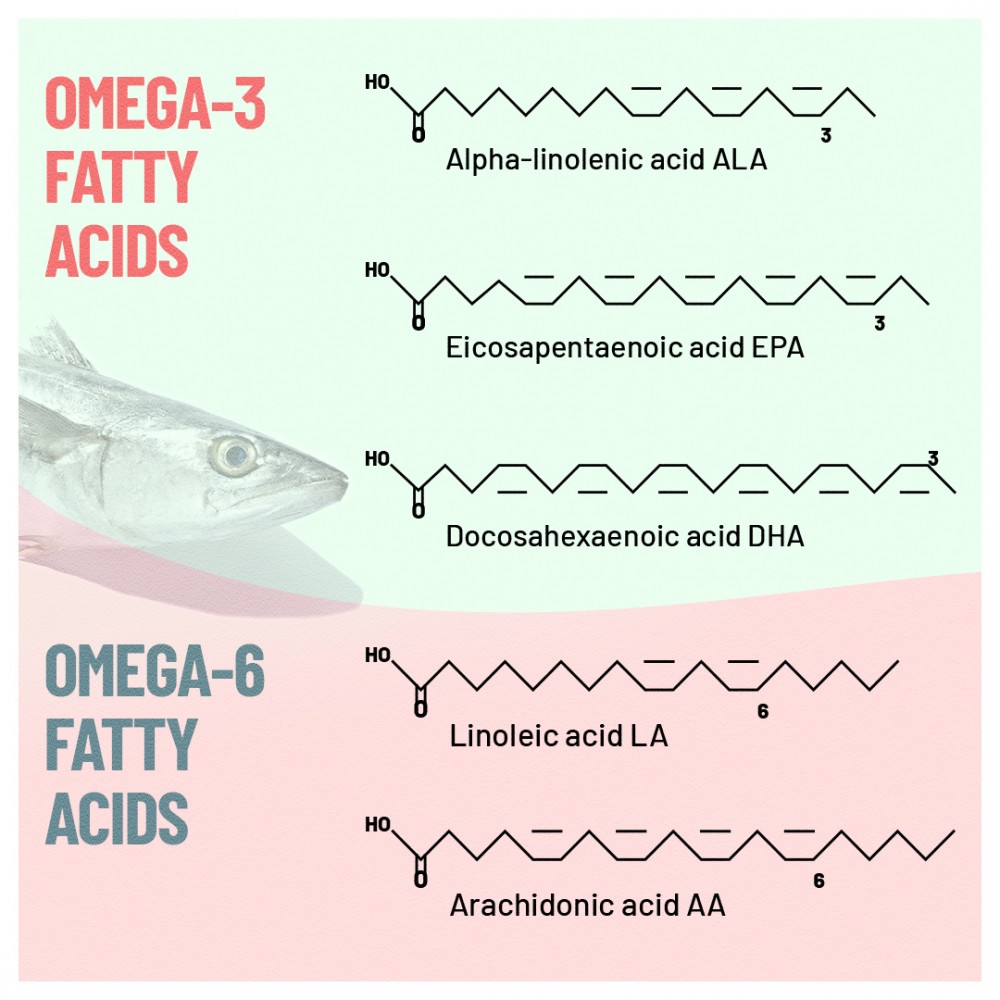
There are several types of omega-3s, but the 3 most common are eicosapentaenoic acid, docosahexaenoic acid, and alpha-linolenic acid. Fortunately, they all have easy acronyms.
EPA (Eicosapentaenoic acid)
EPA is a 20-carbon fatty acid responsible for producing eicosanoids. These chemicals play a huge role in fighting inflammation and have even been shown to improve mental health.1,2 EPA is generally found in oily fish like salmon, mackerel, or sardines. Although it is not produced by the body, it is present in breast milk, and important for infant development.
ALA (Alpha-linolenic acid)
ALA is an 18-carbon fatty acid with special powers; it can be converted into EPA or DHA. The primary role of ALA is to provide us with energy, though it can also prevent cardiovascular disease.3,4 Good sources of ALA include chia seeds, flax seeds, walnuts, hemp, and rapeseed.
DHA (Docosahexaenoic acid)
DHA is a 22-carbon fatty acid that’s critical for a healthy brain. In fact, nearly 8% of your brain is DHA by weight. DHA is especially important for children, since proper brain development depends on it.5 DHA can be found in microalgae and even some plants, although it is most abundant in fish. The higher up the food chain, the more plentiful the supply. DHA from plants actually comes from ALA that has been converted.
Omega-3 Benefits
1 | Fights Inflammation
Chronic inflammation is at the root of almost all chronic disease, including cancer. But the science shows that omega-3s can help regulate inflammatory molecules, keeping inflammation down.
2 | Improves Cardiovascular Health
Omega-3s are important for your cholesterol and can help keep blood pressure down. They can even prevent plaque in the arteries, which is important – cardiovascular disease is the #1 cause of death in the U.S. and is associated with a higher cancer risk.6-8
3 | Improves Mental Health
Depression and anxiety are rampant in Western culture – and on the rise. But omega-3s don’t just prevent them. Omega-3 supplements have actually been shown to reverse depression and anxiety. They can also combat disorders like schizophrenia and bipolar disorder.9-11
4 | Boosts Brain Health
Omega-3s are extremely important when it comes to infant brain development. Even through young adulthood, the brain continues to develop and relies on omega-3s. Not only that, they actually help protect the brain from damage. Studies show that people who eat more fish have slower mental decline and are less likely to suffer from dementia. Omega-3s can even improve memory in older folks.12
5 | Fights Autoimmune Disease
Autoimmune diseases occur when your body attacks healthy cells, mistaking them for malignant cells. Arthritis, lupus, multiple sclerosis, and diabetes are all examples of autoimmune disease. Research shows that getting enough omega-3s early in life can significantly reduce your risk of these diseases.13,14
6 | Prevents Cancer
Improved cardiovascular health is an excellent way to reduce your cancer risk. But omega-3s do more than that. These fatty acids have been shown to reduce the risk of prostate cancer, breast cancer, and colon cancer. For those who consume the most omega-3s, the risk for colon cancer was reduced by over 50%!15,16
The list goes on. Omega-3s are also responsible for promoting bone health, regulating weight, fighting asthma, improving sleep, reducing symptoms of ADHD, and improving eyesight. 17-22 The important thing to remember is that you can only get omega-3s through diet and supplements. The Standard American Diet (SAD) hardly offers any at all, so make sure you incorporate plenty of these essential fatty acids into your diet.
Omega-6 Fatty Acids
Just like omega-3s, omega-6 fatty acids are polyunsaturated fatty acids. But as you may have guessed, the last double bond is six carbon atoms away from the omega, hence “omega-6”. Additionally, like omega-3s, omega-6s cannot be produced by your body, so you need to get them through your diet.
Omega-6 fatty acids are essential for your health, especially for energy.
The most common omega-6 fat is linoleic acid, which can be converted into longer omega-6 fats such as arachidonic acid (ARA). ARA also produces eicosanoids, but they are more pro-inflammatory than those produced by EPA. These pro-inflammatory chemicals are vital for the immune system, but overproduction can lead to chronic inflammation and disease.23
Unlike omega-3s, omega-6s are abundant in the Standard American Diet. It’s estimated that Westerners consume up to ten times the necessary omega-6 fatty acids. They’re still essential, but it’s likely that you will need to decrease your intake rather than increase it.
The most common sources of omega-6 fatty acids are poultry and eggs, grains, leafy greens, and unfortunately, unhealthy oils like vegetable oil or canola oil. Most of our omega-6s come from processed foods. While it’s important to limit your intake of omega-6s, they do offer a number of health benefits.
Omega-6 Benefits
1 | Promotes Inflammation
I know this sounds confusing. But acute, temporary inflammation is extremely important to the body’s healing process. When you cut yourself or sprain an ankle, your body responds with targeted inflammation. This activates the healing process and even protects against infection. Linoleic acid found in omega-6s helps regulate this “good” inflammation.24
2 | Fights Allergies
Though there are few studies on the relationship between omega-6 fatty acids and allergies, they (along with supplements derived from them) have been used for generations as a home remedy. Women with severe allergies are likely to have lower levels of gamma-linolenic acid, or GLA – a product of linoleic acid – in their breast milk and blood.25
3 | Combats Cancer
Some studies have found that GLA can actually increase the effectiveness of other cancer treatments, while others show that GLA inhibits tumor growth and metastasis. Omega-6 fatty acids have also been shown to reduce the symptoms of mastalgia.26,27
4 | Improves Bone Health
Studies show that omega-6s may help to prevent bone loss and osteoporosis. In a study of women over 65 with osteoporosis, those who got extra omega-6 fatty acids experienced less bone loss than the control group.28
The biggest thing to remember is that too many omega-6 fatty acids are bad and can actually contribute to disease.29 They’re essential, so you’ll need to get some in your diet, but processed foods and grains will likely give you more than you need and make you sick. Most experts recommend a 4:1 ratio of omega-6 fatty acids to omega-3s.
 Omega-9 Fatty Acids
Omega-9 Fatty Acids
Omega-9 fatty acids are different than their cousins in that they are monounsaturated, meaning they only have one double bond. As you may have guessed, it’s located nine carbon atoms away from the omega end of the fatty acid molecule. Oleic acid (which doesn’t have a cool acronym) is the most common omega-9 fatty acid. In fact, it’s the most common monounsaturated fat in your diet.
Also, unlike omega-3s and omega-6s, omega-9s are not essential, since your body can produce them. These fats are among the most bountiful in your body. But the fact that they’re not technically essential doesn’t mean you don’t need them in your diet. Omega-9 fatty acids have many health benefits over other types of fat. The best sources of omega-9s are sunflower, avocado, animal fat, and macadamia nuts.
Omega-9 Benefits
1 | Increased Energy
One study found that by increasing monounsaturated fats and decreasing saturated fatty acids, subjects had increased energy and got more physical activity. Increased physical activity can also lead to better sleep, better mood, and better health, so swapping out saturated fats for omega-9s could literally change your life!30
2 | Protects Against Cardiovascular Disease
Omega-9s have been shown to increase HDL cholesterol and decrease LDL cholesterol. This helps regulate blood pressure and reduce arterial plaque buildup. All of these things lower your risk of heart disease and strokes. As we learned earlier, heart disease is a major risk factor for cancer, and the leading cause of death in the United States.31
3 | Reduces Inflammation
A study on mice found that diets high in monounsaturated fats decreased inflammation. In humans, the researchers found that those with diets high in omega-9 fatty acids had less inflammation and better insulin sensitivity then their saturated fat counterparts.32
4 | Improves Brain Health
One type of omega-9 fatty acid is erucic acid, which may benefit dementia patients. Studies have demonstrated that erucic acid can help improve memory and cognitive function in patients with dementia.33
Since the body can produce omega-9 fatty acids, they aren’t as important to supplement. However, the advantages of omega-9s over saturated fats are tremendous. Consider introducing more healthy fats, like avocado and sunflower oils, for better energy, reduced cardiovascular risk, and better brain health.
Omega 3 6 9: A Summary
While each of these fatty acids has a role to play, omega-3s are probably the most important as far as supplementation. The best way to get lots of omega-3s is through fish, though many great supplements are available.
Omega-6 fatty acids, on the other hand, are already abundant in the Standard American Diet. Since excess omega-6s can be bad for your health, it’s best to eliminate processed foods and excess grains. Don’t worry – you can still get plenty of omega-6s from dark, leafy greens.
Omega-9 fatty acids are not considered essential since the body produces them naturally. But their benefits are excellent, especially when compared with saturated fats. Next time you reach for that bacon and cheese, try something high in omega-9s instead.
A qualified nutritionist can say exactly how much of each fatty acid you need, but if you follow these tips, keep the 3s up, the 6s down, and the 9s around, you’ll be on the road to improved health in no time.
Editor’s Note – This article was initially published in 2022 and has been updated in 2024.
Article Summary
It’s important to make sure you get the right balance of each omega for optimal health.
Omega-3 benefits:
- Fights inflammation
- Improves cardiovascular health
- Improved mental health
- Boosting brain health
- Fights autoimmune disease
- Prevents cancer
You will likely need to decrease your intake of Omega-6s rather than increase it.
- Omega-6 benefits:
- Promotes acute inflammation
- Fights allergies
- Combats cancer
- Improves bone health
Omega-9 benefits:
- Increased energy
- Protects against cardiovascular disease
- Reduces inflammation
- Improves brain health
Omega-3s are probably the most important as far as supplementation.










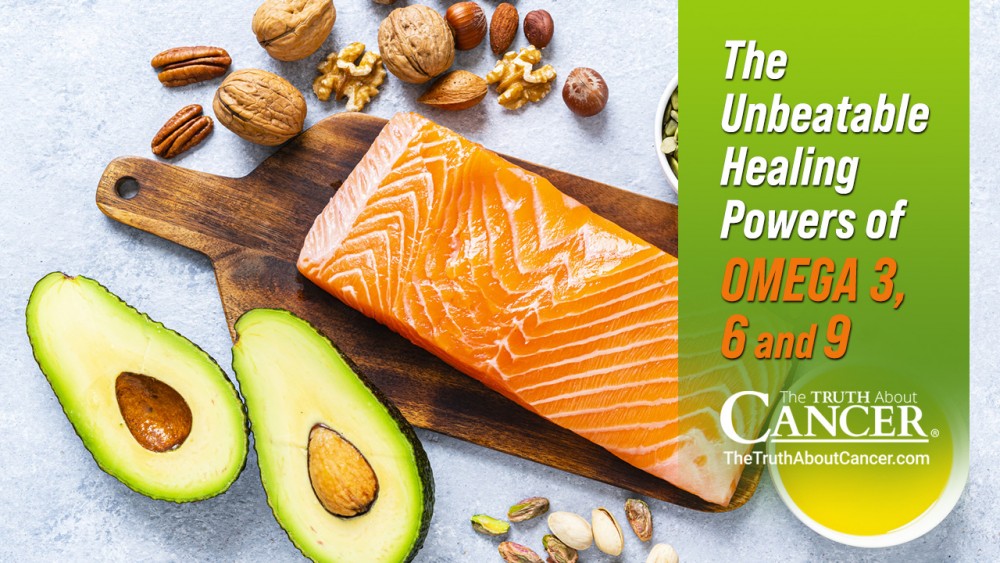
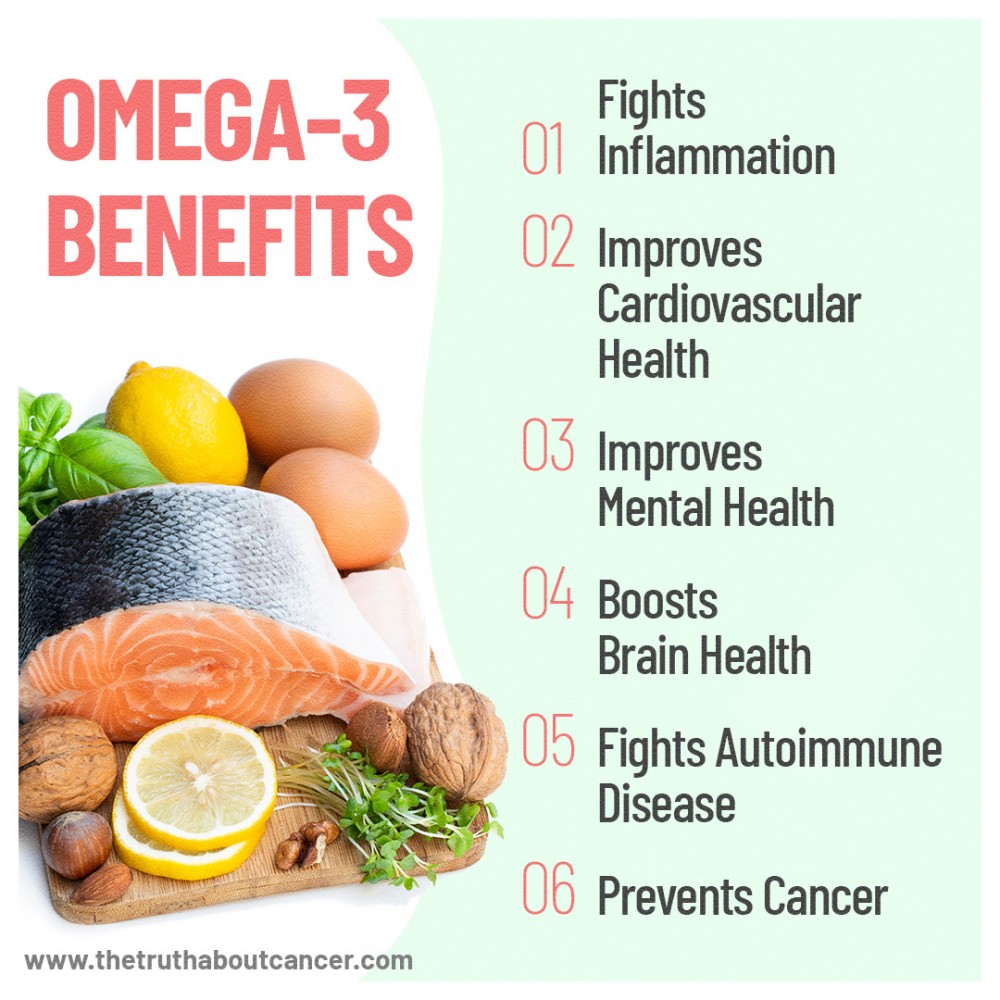
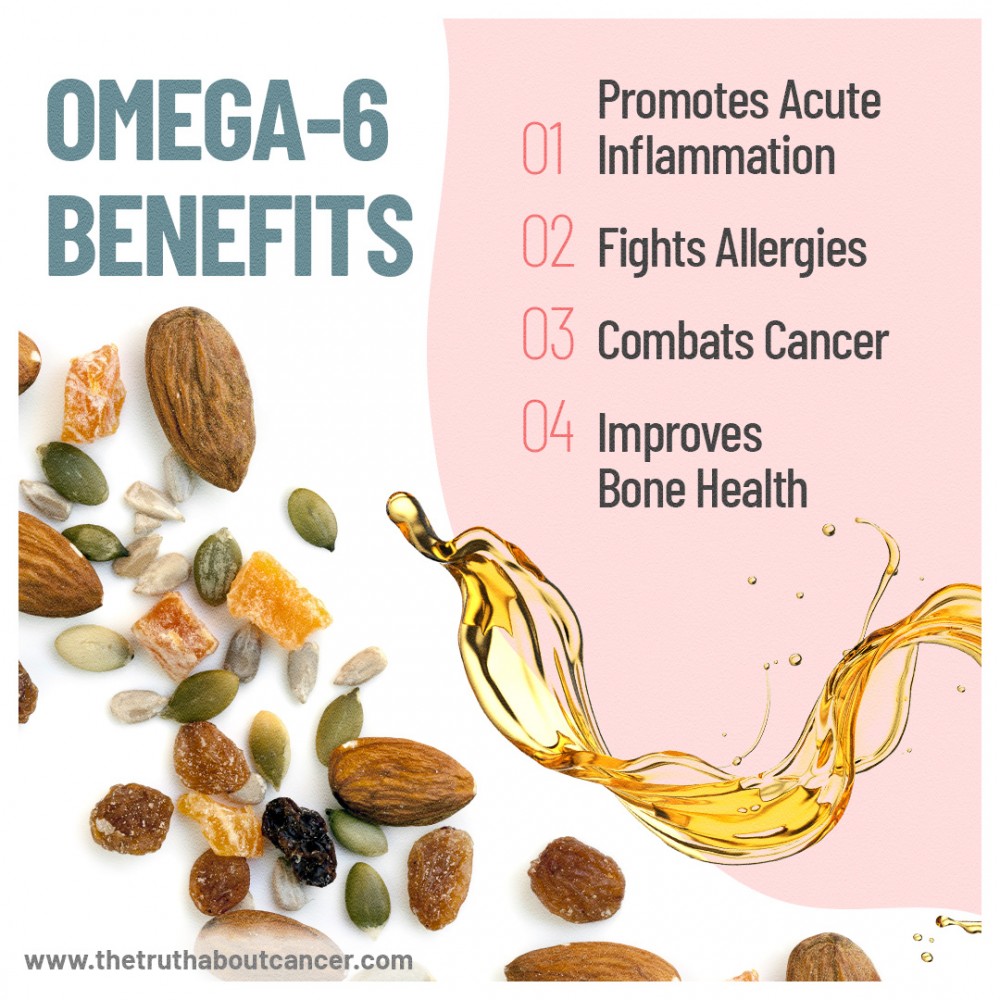 Omega-9 Fatty Acids
Omega-9 Fatty Acids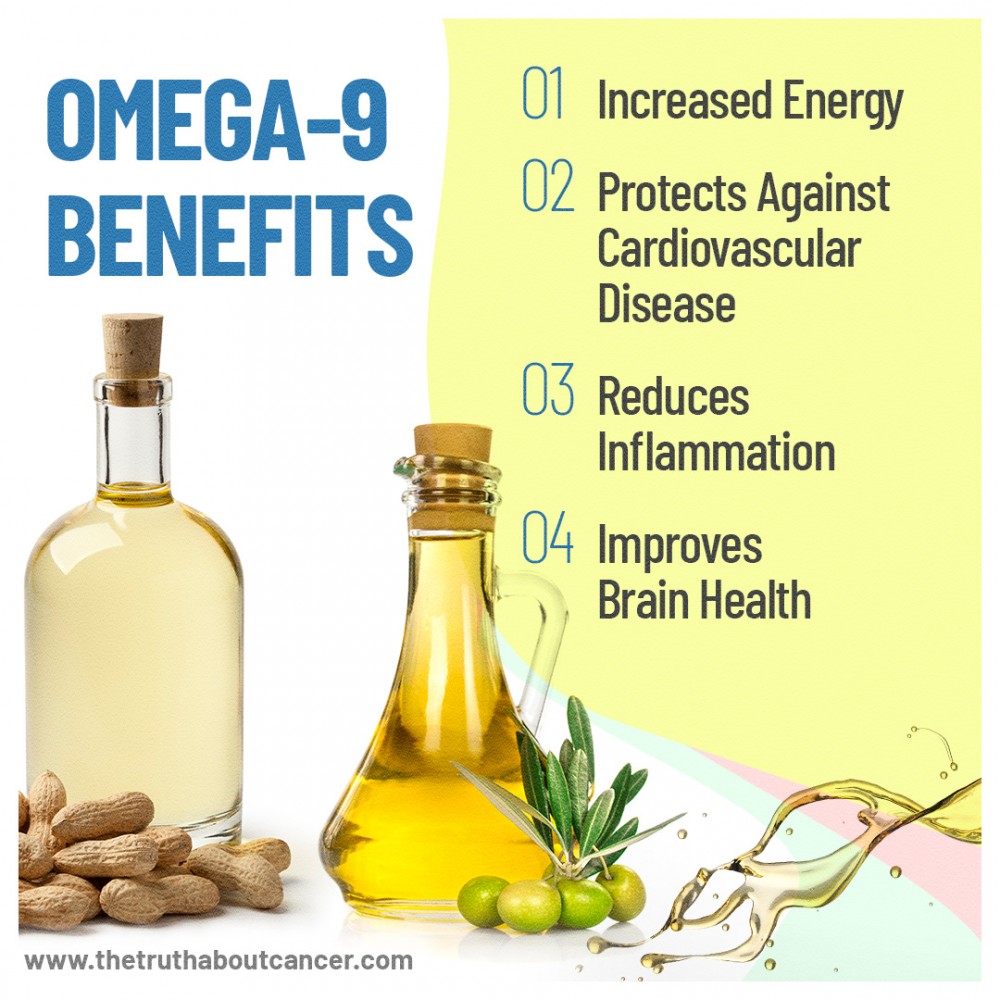








Ty and Charlene…Thank you for ALL you are doing. Each and every one of your articles, links, blue words, “you may like’s” are loaded with so much easily understandable information. It began with your Propaganda Exposed series and continues to be the most informative site on the internet that I’ve been ‘Exposed ‘ to. My wife passed from lung cancer in May ’21. I believe that she may still be here if I had known more of this info. And, of course, if she would have taken this advice. I will continue to forward these articles to those who may be afflicted or have family members who are. I look forward to reading the “rest of your stories” and, again, Thank you for all you are doing. I wish, and hope, to someday donate to your ongoing quest for truth. Till then, God Bless You!!
My journey to you started with Ty’s book with Dr. Axe & Jordan Ruban, Ancient Aromatherapy. I just want to thank you for being such brave warriors in this fight. I left NY because of a mandate from my employer, Memorial Sloan Kettering, and moved to Florida. In the almost 9 months, I have learned so much about the pharm industry. As I have been a part of it for over 40yrs, it’s an eye opener. I will keep you and your family in my prayers. May the Lord bless you & protect you always. Diane Eder